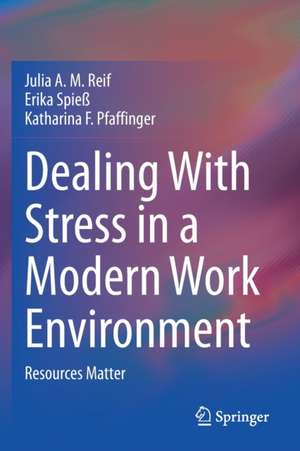Dealing With Stress in a Modern Work Environment: Resources Matter
Autor Julia A. M. Reif, Erika Spieß, Katharina F. Pfaffingeren Limba Engleză Paperback – mar 2022
Building on proven and contemporary psychological theories of stress and resource research, this book explains how stress emerges, how resources influence the stress process and what individuals and organizations can do to prevent stressors, reduce stress, recover from stress, and cope with the long-term consequences of strain. The book takes up current societal trends such as digitization and automation, and refers to cultural influences and differences.
Through numerous case studies, facts and figures, checklists and exercises, the book not only leads the readeron an exciting journey through the scientific background and history of stress research, but also offers numerous opportunities for self-assessment and critical reflection on (one's own) work in organizations.
| Toate formatele și edițiile | Preț | Express |
|---|---|---|
| Paperback (1) | 580.43 lei 6-8 săpt. | |
| Springer International Publishing – mar 2022 | 580.43 lei 6-8 săpt. | |
| Hardback (1) | 586.09 lei 6-8 săpt. | |
| Springer International Publishing – 28 feb 2021 | 586.09 lei 6-8 săpt. |
Preț: 580.43 lei
Preț vechi: 682.86 lei
-15% Nou
Puncte Express: 871
Preț estimativ în valută:
111.07€ • 118.77$ • 92.60£
111.07€ • 118.77$ • 92.60£
Carte tipărită la comandă
Livrare economică 17 aprilie-01 mai
Preluare comenzi: 021 569.72.76
Specificații
ISBN-13: 9783030585006
ISBN-10: 303058500X
Pagini: 194
Ilustrații: VIII, 194 p. 28 illus., 27 illus. in color.
Dimensiuni: 155 x 235 mm
Greutate: 0.32 kg
Ediția:1st ed. 2021
Editura: Springer International Publishing
Colecția Springer
Locul publicării:Cham, Switzerland
ISBN-10: 303058500X
Pagini: 194
Ilustrații: VIII, 194 p. 28 illus., 27 illus. in color.
Dimensiuni: 155 x 235 mm
Greutate: 0.32 kg
Ediția:1st ed. 2021
Editura: Springer International Publishing
Colecția Springer
Locul publicării:Cham, Switzerland
Cuprins
Chapter 1. Understanding stress.- Chapter 2. Sources of stressors.- Chapter 3. Psychological models of stressors.- Chapter 4. Perception and appraisal of stressors.- Chapter 5. Resources matter.- Chapter 6. Psychological models of demands and resources.- Chapter 7. Reactions to stress – stress as a response.- Chapter 8. Dealing with stress.- Chapter 9. Recovery.- Chapter 10. Stress, resources, and the future of work.
Notă biografică
Dr. Julia A. M. Reif is postdoctoral scientific staff member and lecturer of Economic and Organisational Psychology at the Ludwig-Maximilians-Universitaet Muenchen, Munich. Her research interests include the initiation of negotiation, team processes, stress management, and organizational acculturation. She is a frequent speaker at international psychology conferences and congresses, and publishes her research in leading academic journals. She works as a scientific consultant with businesses and organizations in the fields of organizational diagnostics, organizational development and organizational culture development.
Prof. Dr. Erika Spieß is an associate professor at the Chair of Economic and Organisational Psychology at the Ludwig-Maximilians-Universitaet Muenchen, Munich. She researches and publishes on the topics of cooperation in organizations, intercultural action in business-related contexts, health in organizations and consumer psychology.
Dr. Katharina F. Pfaffinger is a scientific staff member and lecturer of Economic and Organisational Psychology at the Ludwig-Maximilians-Universitaet Muenchen, Munich. Her dissertation examined changing forms of stress as an outcome of a digitalised work.
Prof. Dr. Erika Spieß is an associate professor at the Chair of Economic and Organisational Psychology at the Ludwig-Maximilians-Universitaet Muenchen, Munich. She researches and publishes on the topics of cooperation in organizations, intercultural action in business-related contexts, health in organizations and consumer psychology.
Dr. Katharina F. Pfaffinger is a scientific staff member and lecturer of Economic and Organisational Psychology at the Ludwig-Maximilians-Universitaet Muenchen, Munich. Her dissertation examined changing forms of stress as an outcome of a digitalised work.
Textul de pe ultima copertă
This book provides an evidence-based, comprehensive and vividly illustrated overview of stress and stress management, emphasizing the central role of resources. Scientists and practitioners, students, employees and employers can use this book to bring themselves up to date on the current state of psychological stress research and learn many practical tips and tricks for dealing with stress and resources.
Building on proven and contemporary psychological theories of stress and resource research, this book explains how stress emerges, how resources influence the stress process and what individuals and organizations can do to prevent stressors, reduce stress, recover from stress, and cope with the long-term consequences of strain. The book takes up current societal trends such as digitization and automation, and refers to cultural influences and differences.
Through numerous case studies, facts and figures, checklists and exercises, the book not only leads the reader onan exciting journey through the scientific background and history of stress research, but also offers numerous opportunities for self-assessment and critical reflection on (one's own) work in organizations.
Building on proven and contemporary psychological theories of stress and resource research, this book explains how stress emerges, how resources influence the stress process and what individuals and organizations can do to prevent stressors, reduce stress, recover from stress, and cope with the long-term consequences of strain. The book takes up current societal trends such as digitization and automation, and refers to cultural influences and differences.
Through numerous case studies, facts and figures, checklists and exercises, the book not only leads the reader onan exciting journey through the scientific background and history of stress research, but also offers numerous opportunities for self-assessment and critical reflection on (one's own) work in organizations.
Caracteristici
Describes the current state of theory and research on stress and resources Takes up current societal trends such as digitization and automation Offers numerous opportunities for self-assessment regarding stress and resources Stimulates a critical reflection on (one's own) work in organizations Introduces evidence-based approaches to designing humane working environments Describes what individuals and organizations can do to manage stress effectively
